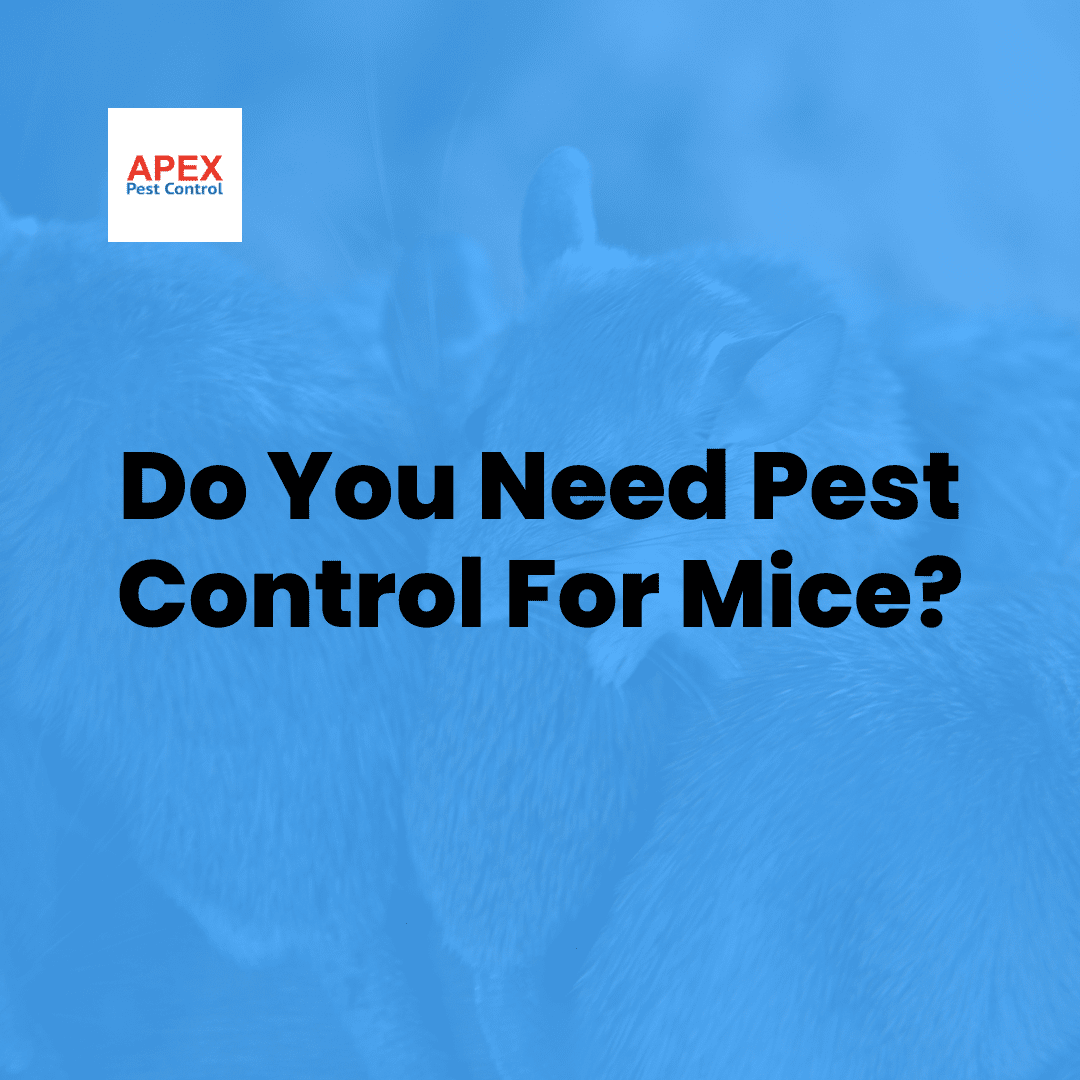Who Needs Pest Control for Mice?
Pest control for mice is an essential service for homeowners, businesses, and property managers who are dealing with an infestation of mice. Mice not only cause damage to your property but also can carry diseases that can be harmful to you, your family and your pets.
These small rodents are known to reproduce rapidly and can quickly take over your home or business, making it important to address a mouse infestation as soon as possible.
Pest control professionals have the tools, knowledge and expertise to identify the problem, create a comprehensive plan and use the appropriate methods to rid your home or business of mice and keep them from coming back.
Who Needs Pest Control for Mice?

Anyone who is dealing with an infestation of house mice may need pest control services. This includes homeowners, landlords, and property managers. Mice infestations can occur in residential, commercial, and industrial properties.
Some common places that might have a mouse infestation are:
- homes
- apartments
- hotels
- supermarkets
- commercial kitchens
- warehouses
- barns
Or any other place that provides food, water and shelter for mice.
Mice infestations can cause significant damage to the property, and the droppings and urine can create unsanitary conditions, leading to potential health hazards for the occupants.
Mice are also known to chew on electrical wires, which can be a fire hazard. So, if you suspect or have confirmed a mouse infestation, it is best to contact a pest control professional right away to address the issue and prevent any further problems.
What are The Signs of a Mouse Infestation?

The signs of a mouse infestation invading your home can be subtle, but once you know what to look for, they can be easy to spot. One of the most obvious signs of a mouse infestation is the presence of droppings. Mouse droppings are small, dark, and rod-shaped.
They are typically found in areas where mice are active, such as near food sources or in areas where they are nesting. For example, you may find droppings in your pantry, near your pet’s food bowl, or under your sink. A dead mouse found around the house can also be a sign of infestations.
Another sign of a mouse infestation in your house is gnaw marks. Mice have constantly growing incisors, which they must gnaw on to keep short. They will gnaw on wood, plastic, or other materials around your home. You may find gnaw marks on the corners of food boxes or on the legs of furniture.
Keep in mind that mice can chew through a wide variety of materials, so gnawing marks may not always be visible.
Mice are known to build nests out of materials like paper, insulation, and fabric. These nests can be found in hidden areas like attics, basements, and wall cavities. Check for small, rounded clumps of materials that may have been used to create a nest. If you see something that looks like a nest, it’s a strong indication that you have a mouse infestation.
Lastly, if you hear scurrying or squeaking sounds coming from within your walls or ceilings, it could be an indication of a mouse infestation. Mice are active at night, so these sounds are most likely to be heard during the evening or early morning hours.
It’s important to note that mice are timid animals and often avoid human interactions, therefore it’s not always easy to see a mouse, but these signs can give you an idea if they are around.
If you suspect a house mouse infestation, it’s best to contact a pest control professional or commercial pest control company as they can help identify the problem and develop a plan to get rid of the mice.
How to Prevent Rodents from Entering Your Building?

To prevent mice from entering your building is crucial to keeping your home or business free from infestations and the potential damage they can cause. One of the most important steps in preventing rodent infestation is to locate and seal off any potential entry points.
Rodents can squeeze through incredibly small spaces, so it’s important to pay attention to details and seal off gaps around doors and windows, holes in the foundation or walls, and vents without screens.
Use weather-stripping, door sweeps, and caulking to fill in any gaps, and make sure to keep doors and windows closed and locked when not in use. This will make it difficult for rodents to find a way in and will discourage them from entering your building.
Another important step in preventing rodent infestation is to keep food and garbage sealed. Rodents are attracted to food and garbage, so it’s important to keep these things stored properly.
Make sure to keep all food in sealed containers, dispose of garbage regularly in sealed containers, and keep kitchen counters and floors clean and free of crumbs. Store pet food in sealed containers and avoid leaving food out overnight. This will limit the food sources that might attract rodents to your building.
Regular cleaning and maintenance can also help prevent rodent infestations. This means cleaning up any spilled food or crumbs immediately, vacuuming and sweeping regularly, and keeping storage areas organised and free of clutter. By keeping your building clean and orderly, you will make it less attractive to rodents and easier to spot any signs of infestation.
It’s important to be vigilant about checking for signs of rodent activity and call a pest control professional if you suspect an infestation. Regular inspections are also crucial to detect any early signs of infestation and prevent them from escalating.
How To Get Rid of Mice In Your Home?

The first step in getting rid of mice is to eliminate their food and water sources. This includes storing food in sealed containers, cleaning up crumbs and spills, and fixing any leaks or other sources of water. It is also important to keep the floors and countertops clean and free of clutter.
Another key step in getting rid of mice is to use humane traps to catch and remove them from your home. Live traps, such as humane mouse traps, allow you to catch white footed mice without harming them and you can release them in an outdoor location.
Along with that, you may also use bait traps, which are used with rodent baits and when the mouse enters the trap, the door will close behind it, trapping the mouse inside. It’s important to check these traps regularly and release any caught mice as soon as possible.
You can also use snap traps and bait stations, which are a quick way to kill a mouse but not as humane. It is important to use caution when using snap traps, as they can be dangerous for children and pets.
In addition to these steps, it is also important to look for and seal off any potential entry points, such as gaps around doors and windows, holes in the foundation or walls, and vents without screens. It will prevent any further mice from entering the house, and it will restrict the movement of the mice that are already inside the home.
It is also recommended to contact a professional pest control company or pest control experts who can help identify the problem, create a comprehensive plan and use the appropriate methods to eliminate mice.
When is it Time to Call a Professional?

If you’ve tried all of the above advice, it’s likely time to call in a professional. They will have the tools and expertise to identify the source of the problem and develop an effective plan to eliminate the mice.
If you’re unable to locate the source of the infestation, it’s best to call a professional who will be able to find the entry points and identify the conditions that are attracting mice to your home.
It’s better to catch them while the mouse population isn’t that high and there are just a few mice. If you’re unable to safely and humanely dispose of the mice you’ve caught, it’s best to call a professional for help or if you’re experiencing a severe infestation, it may be necessary to call a professional.
A severe infestation is characterised by a large number of mice or even field mice, extensive damage, or the presence of diseases or pathogens. If you are unsure about how to get rid of mice, or you’re not comfortable with handling live traps or bait, it’s best to call a professional for help. They will have the tools and expertise to safely and effectively get rid of the mice in your home.
What Kind Of Traps Are Used To Kill Mice?

There are several types of traps that are commonly used to kill mice, including:
- Snap traps
- Glue traps
- Electronic traps
Snap traps are designed to kill the mouse quickly and humanely, usually by breaking its neck. They work by luring the mouse into the trap with bait, and when the mouse takes the bait, a spring-loaded bar snaps shut, killing the mouse instantly.
Glue traps, on the other hand, consist of a board or tray covered with a sticky adhesive.
When a mouse comes in contact with the adhesive, it becomes stuck and is unable to escape, eventually dying from starvation or dehydration. Glue traps are not considered a humane method as it can cause prolonged suffering for the mouse before dying.
Another type of trap that can be used to kill mice is an electronic trap, this trap works by luring the mouse with bait and once the mouse enters the trap, it will deliver a high voltage electrical shock to the rodent, killing it instantly.
Electronic traps are considered to be a more efficient and easy way to dispose of mice because they kill the mouse quickly and do not require you to check or dispose of the trap as often as traditional snap or glue traps.
Another option is using poisoned bait, which is a type of bait that is mixed with poison, it will work by attracting the mouse to the bait and once the mouse eats it, it will be killed. The poison in the bait will act as a rodenticide, which causes death to the mouse.
Keep in mind that poisoned bait can also be a health hazard to humans and pets, they can be contaminated with the poison and that can cause severe health issues. It is not recommended to use poisoned bait in areas where children and pets can easily access. Also the dead mice could be difficult to find and can cause bad odour inside the home.
If you are in need of help with trapping mice, cockroach control, tick control, bird control, squirrel control, wildlife control and other pest control resources, call your local pest management company like Apex Pest Control.
They can help with rodent inspection and protection plans to prevent infestation in your home.

Tony Johnson, Founder & Lead Technician at Apex Pest Control, is a BPCA and NPTA accredited pest management expert with over 35 years’ hands-on experience. Tony specialises in Integrated Pest Management and ensures all services comply with UK pest legislation, including the Wildlife and Countryside Act 1981 and COSHH Regulations 2002. His commitment to continual learning and adapting to industry best practices means clients receive effective, safe solutions for pests affecting homes and businesses across South Yorkshire. Tony’s dedication to professional standards, ethical treatment methods, and local expertise has made him a trusted partner for pest control and prevention.
-
BPCA & NPTA accredited | CHAS certified
-
Committed to UK pest law compliance & safety
-
Focused on effective, ethical pest management for South Yorkshire


